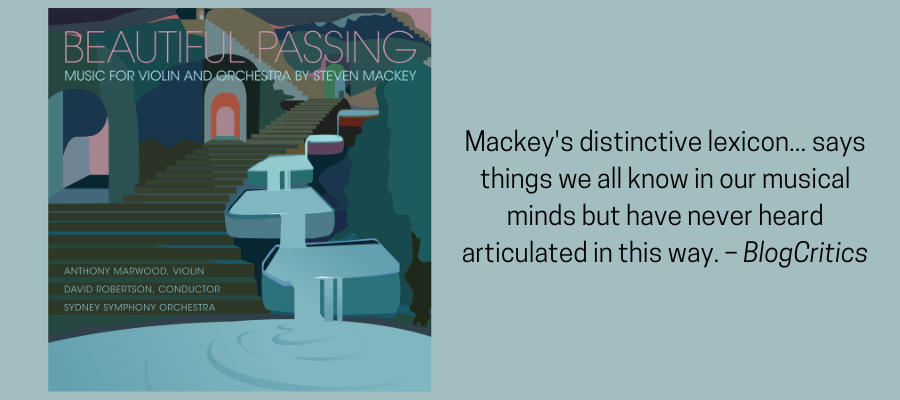Featuring the Sydney Symphony Orchestra Led by David Robertson in Mackey’s Mnemosyne’s Pool and his Violin Concerto Beautiful Passing with Anthony Marwood
On Friday, December 9, 2022, GRAMMY-winning composer Steven Mackey releases a portrait album of his music for violin and orchestra, Beautiful Passing, on Canary Classics. Works include Mackey’s violin concerto Beautiful Passing (2008), with soloist Anthony Marwood, and his symphony, Mnemosyne’s Pool (2014), both recorded live by the Sydney Symphony Orchestra led by conductor David Robertson. Mackey shares deeply personal accompanying notes in the booklet, followed by a conversation with longtime collaborator of more than 15 years, David Robertson. The conductor leads the National Symphony Orchestra in performances of Mnemosyne’s Pool on December 1, 2, and 3, 2022 at The Kennedy Center in Washington, D.C. The NSO, alongside the Los Angeles Philharmonic, Sydney Symphony Orchestra, and New World Symphony, commissioned the symphony.
Mackey introduces the album, “All of the music on Beautiful Passing engages with memory, albeit in different ways. Mnemosyne’s Pool deals with memory within the music itself, and in so doing it deals with our memory, the human capacity for memory and the act of remembering. Beautiful Passing deals with my memory, a particular memory from my personal experience which gave rise to the music and may in turn invite related memories from the listener.”
Mackey’s violin concerto Beautiful Passing (2008) – performed on this album with British violinist Anthony Marwood MBE – is a work in two halves, separated by a cadenza. It was inspired by Mackey’s experience watching his mother pass away from esophageal cancer. He shares, “During this time, I was working on a violin concerto which was intended to be a flashy show piece, but I lost my mojo for that and could not stop thinking about the three states of being that this experience had drawn so expressively: First, my mother’s serenity and strength as she assumed control of her destiny. That calm stood in sharp contrast to, second, the frantic, albeit benign, chatter around her from the electric, phone, and cable TV companies haggling over prorated charges, as well as the nurses, aides, and friends (myself included) who did not believe that she had any agency in in this matter. Third and finally, my insomnia and the flickering consciousness between wakefulness and sleep. As I reflected on this last state, I pondered what my mother’s experience of flickering consciousness between life and death might have been like. I was filled with admiration as I realized that I had been unable to relinquish consciousness for a mere six to eight hours, while my mother let go for eternity, as far as we know. Beautiful Passing does not attempt to retell the story of my mother’s passing but rather to distill those three states of being into musical threads that interact with one another as musical elements do, not as my story did. The ‘story’ is a linear narrative, while the composition follows a quite different, musical logic.”
The work was co-commissioned by the BBC Philharmonic and St. Louis Symphony, with Music Director David Robertson, and premiered by violinist Leila Josefowicz with the BBC Philharmonic led by Juraj Valcuha in 2008. The Guardian raved, “It contends, asserts, floats and flickers, but entirely on Mackey’s own stylistic terms. The piece is all the stronger for the negativity it grapples with, and maybe that will prove to be so of his work as a whole.”
Described by Musical America as “the first great American symphony of the 21st century,” Mnemosyne’s Pool (2014) is a 40-minute symphonic saga in five movements with recurring musical characters that develop an expansive narrative. Mnemosyne was a Greek titaness, the goddess of memory and mother to the nine muses. She personified the memory required to preserve and retell the sagas of history and myth. She also presided over a pool in Hades which was the counterpart to the River Lethe, from which those who journeyed through the underworld drank to forget their past lives when reincarnated. Mnemosyne’s pool of remembrance was less frequented. Mackey explains, “While I composed Mnemosyne’s Pool, the role of memory in the perception of music was more of a conscious fascination than usual for me. Consider a note that does not flow naturally from the note it succeeds but is recalled from an earlier point in a musical line. A large awkward leap can signal to the listener and performer that this note relates more to its own previous occurrence than it does to the immediately preceding note. This disjuncture can ask the listener to remember an earlier point in the line instead of moving inexorably forward. We get to taste the peculiar flavor of the awkward leap but ultimately digest it. Ostensibly odd musical grammar in the present tense can be understood as an artifact of the past tense when it accompanies a remembered event, like a film’s sepia hue telling us that the scene is meant to be a recollection. Musical grammar and memory can work together to create various shades of (dis)continuity.” The symphony was premiered by the Los Angeles Philharmonic under the baton of Gustavo Dudamel in 2015.
